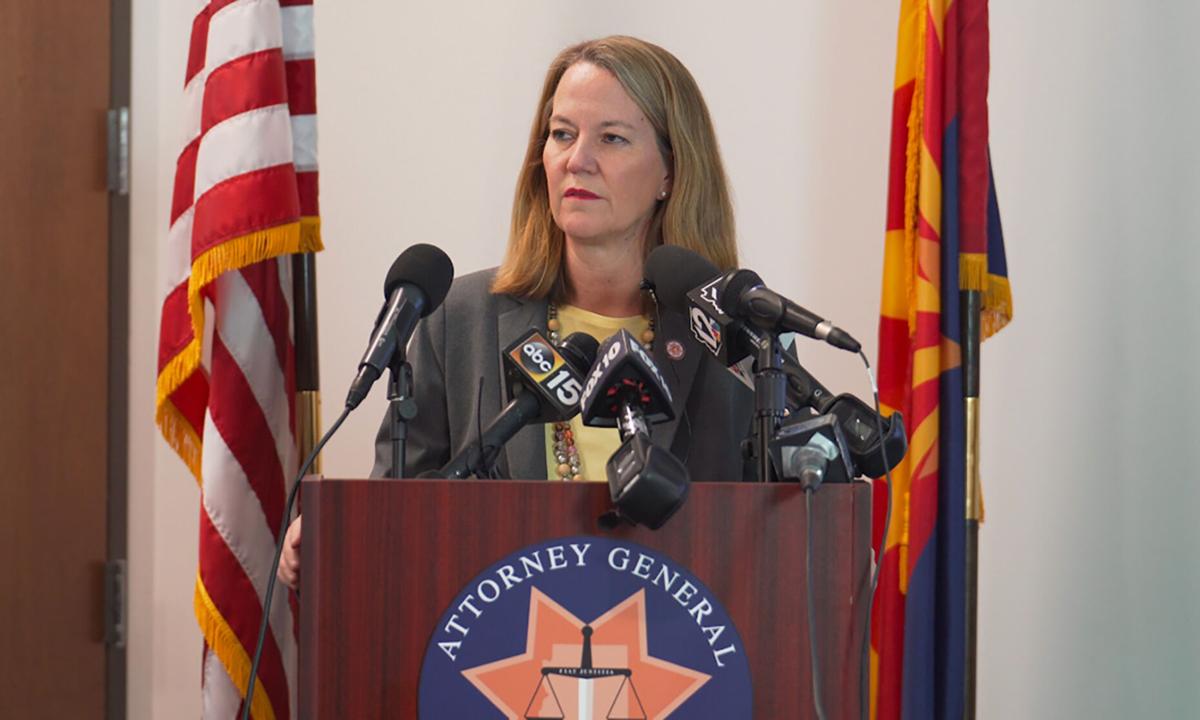PHOENIX — Attorney General Kris Mayes says she won’t let lawmakers and the governor “illegally” seize $75 million from an opioid settlement to balance the state budget, and she’s prepared to go to court.
The budget plan set for final vote Friday proposes moving dollars from the settlement over to the state Department of Corrections, Rehabilitation and Reentry. That agency faces new costs at least in part due to a federal court ruling that it fails to provide proper medical care for inmates.
But the larger problem for Arizona’s overall budget is that the state is running $729 million in the red for the balance of this fiscal year and faces a $690 million deficit in the coming budget year, which starts July 1.
Lawmakers who lead the Republican-controlled Legislature, and Democratic Gov. Katie Hobbs, want to use part of the $1.14 billion settlement the state won in a multi-year lawsuit against manufacturers and pharmacies over opioids.
But Mayes said the settlement includes specific requirements on how the money can be spent — and using it to fix the state budget deficit is not one of them.
Violating the terms would endanger future payments from the opioids settlement for the next 16 years, Mayes told Capitol Media Service. There is still more than $1 billion owed to the state.
But Sen. John Kavanagh, who chairs the Senate Appropriations Committee, said it is Mayes who is off base.
“Eighty percent of prisoners are addicted to drugs or alcohol,’’ he said. “There’s more than enough patients there affected by opioids to spend the money on treating them and rehabilitating them.’’
Mayes said Kavanagh is just partly right.
The attorney general said she has set aside $10 million for opioid treatment of inmates, a number she said is appropriate to the size of the problem. Anything more, she said, is simply a “scheme’’ to balance the budget for the current fiscal year.
The fact it’s a scheme is shown, she said, by the timing of taking $75 million out of the allocation with just two weeks to go before the end of the fiscal year on June 30.
Hobbs, who was involved in negotiating the deal with legislative leaders to transfer the money, has no comment, her press aide Christian Slater said Thursday.
Arizona was one of many states, along with some local communities, that sued manufacturers and pharmacies contending they engaged in policies designed to get people hooked on opioids. Governments were stuck dealing with the fallout of that addiction, including health care, incarceration and treatment costs, the lawsuit said.
In a court-approved settlement, the companies agreed to pay — but with specific guidelines.
These include supporting people in treatment and recovery from opioid-use disorder, discouraging or preventing misuse of opioids, ensuring appropriate prescribing and dispensing of the drug, and providing money to first responders including appropriate practices and precautions when dealing with fentanyl — a particularly potent opioid — and other drugs.
Of the multi-party settlement, Arizona got $502 million, with the balance reserved for counties, cities and towns in the state. All those dollars go through the Attorney General’s Office, however.
Mayes pointed out what Hobbs and lawmakers are proposing isn’t just a one-time raid. She said the budget proposal awaiting legislative action also seeks to take an additional $40 million a year out of the settlement fund for each of the next three years.
“I’m trying to let the Legislature know that this is illegal, it’s inappropriate,’’ the Democratic attorney general said. “I’ve informed the governor’s office they can’t do this.’’
Her hope, Mayes said, is lawmakers will drop their plans to seize the money and instead work with her to find ways spend it legally.
“If that doesn’t happen, then I’m not giving them the money,’’ Mayes said. “It’s in my bank account and it’s not going anywhere, because I’m responsible for the stewardship of the opioid settlement fund. And I cannot allow it to be used for an illegal purpose.’’
“If that means I have to sue the Legislature and the governor, so be it,’’ Mayes said. “If that means they have to sue me, so be it. But those monies aren’t going anywhere and they’re not going to balance their budget this way.’’
Mayes said this isn’t just a turf war. She said the move to take $195 million out of the fund in the four-year period endangers other important programs.
For example, she said, the money helps purchase and distribute naloxone, a drug that can treat narcotic overdoses in emergency situations.
There would be other losses, she said. Mayes said Yavapai and Coconino counties run very successful “jail reentry programs,’’ providing counseling and treatment for inmates before they are released, “providing wrap-around services for them as they’re coming out of jail.’’
She said her plan is to try to replicate those programs in other counties. But she said that can’t happen if the funds are seized to be used elsewhere.
Mayes also listed other priorities for the settlement money. “We have heard about the dire need for detox centers in rural Arizona.”
The $75 million is a crucial part of lawmakers’ efforts to balance the state government’s current budget as required by law.
They need to get total spending for the year down to $17.2 billion. With revenues not matching that figure, that means finding $729 million by June 30.
Part of the deficit is due to the economy, which is deterring some new purchases that would generate sales taxes.
Another factor is that the Republican-controlled Legislature revamped the state income tax system, replacing the prior brackets with a flat 2.5% tax. That had a price tag of about $1.5 billion.
Get your morning recap of today's local news and read the full stories here: tucne.ws/morning
There also are major new costs from lawmakers’ decision to allow all students to get vouchers of state funds to attend private and parochial schools.





